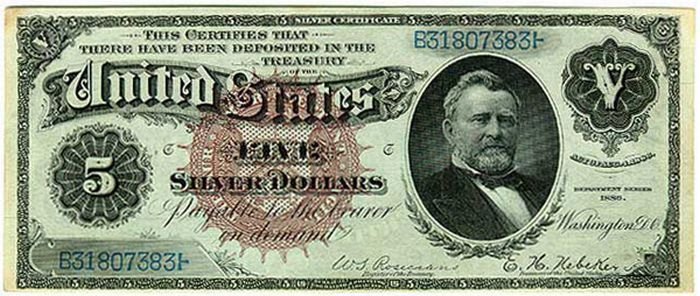|
|
Rare US Dollar Bill
|
Nicknames
The colloquialism "buck" (much like the British word "quid" for the pound sterling) is often used to refer to dollars of various nations, including the U.S. dollar. This term, dating to the 18th century, may have originated with the colonial fur trade. "Greenback" is another nickname originally applied specifically to the 19th century Demand Note dollars created by Abraham Lincoln to finance the costs of the Civil War for the North. The original note was printed in black and green on the back side. It is still used to refer to the U.S. dollar (but not to the dollars of other countries). Other well-known names of the dollar as a whole in denominations include "greenmail", "green" and "dead presidents" (the last because late presidents are pictured on some of the bills).
"Grand", sometimes shortened to simply "G", is a common term for the amount of $1,000. The suffix "K" or "k" (from "kilo-") is also commonly used to denote this amount (such as "$10k" to mean $10,000). In colloquial English, when someone refers to a "large" or "stack", it is usually a reference to an amount that is a multiple of $1,000 (such as "fifty large" meaning $50,000). Banknotes' nicknames are the same as their values (such as "five", "twenty" etc.) The $100 bill is nicknamed "Benjamin", "Benji" or "Franklin" (after Benjamin Franklin, who is pictured on the note), "C-note" (C being the Roman numeral for 100), "Century note" or "bill" (e.g. "two bills" being $200). The $20 bill has been referred to as "double sawbuck", "dub" or "Jackson" (after Andrew Jackson); the $10 bill - as "sawbuck", "ten-spot" or "Hamilton" (after Alexander Hamilton); the $5 bill - as "fin", "fiver" or "five-spot". The $2 bill is sometimes called "deuce", "Tom", "Jefferson" or "T.J." (after Thomas Jefferson); and the $1 bill - "single" or "buck". The dollar has also been referred to as a "bone" and "bones" in plural (e.g. "twenty bones" is equal to $20) or a "bean". The newer designs are sometimes referred to as "Bigface" bills or "Monopoly money". Some people refer to U.S. money as "cha-chingers", "bucks", "green-backs" and "smackers".
In French-speaking areas of Louisiana, the dollar is referred to as "piastre" (pronounced "pee-as") and the French holdover "sous" (pronounced "soo") is used to refer to the cent.
|
|









